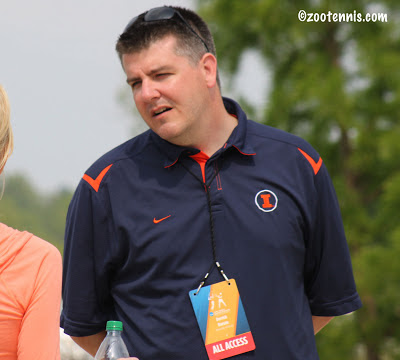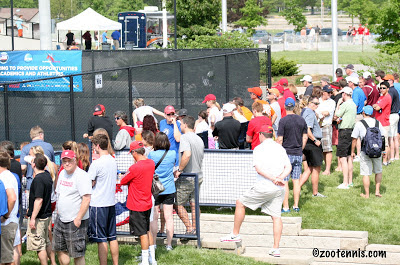NCAA Individual Recap; My Notes and Observations from Twelve Days in Urbana
My recap of the NCAA Division I individual tournament is available today at the Tennis Recruiting Network, and if you missed it last week, my recap of the team tournament is here.
The slideshow and videos will come in the next week, but I thought I'd pass along some of my thoughts about this year's tournament before it recedes from memory.
During the tournament, some prominent former college tennis players engaged in a spirited back-and-forth on twitter about the relative merits of Illinois vs. Athens as a host site. I take a backseat to no one in my appreciation for Athens, with its tradition, facility, efficiency and attendance. But Athens is not perfect--the outdoor court setup makes it difficult, if not impossible, to track two matches at once--and with only four indoor courts available, the always traumatic rain event becomes even more so.
As a veteran of the last nine NCAAs, I feel qualified to call Illinois' hosting an unqualified success, and I hesitate to even mention that it was their first time, lest that sound like there were issues more experience could have prevented.
I didn't see anything like that, with the attention to detail and willingness to accommodate exemplary. Now to the specifics of what I liked:
 |
| Derrick Burson, Illinois associate SID |
The media staff was terrific and I would like to personally thank Derrick Burson, Nicole Mechling and Joshua Bates and staff for all their help. They were dedicated, their work was timely and accurate, and when the rain caused the standard operating procedures to go out the window, they were resourceful and cheerful, despite severe sleep deprivation.
 |
| Even tournament director Holly Stalcup manned the squeegees. |
The rain crew was fast and efficient, no doubt aided by the constant wind, which, if I recall correctly, was a factor in 10 of the 12 days of play.
Being able to watch two dual matches by taking just a few steps, or being able to really track all 12 matches on court in the individual tournament probably spoiled me for other venues.
The hospitality was exceptional, the parking free, the concessions reasonably priced, and considering the lack of an Illinois team the first six days and the lack of good weather the next six, attendance was good.
 |
| The facility was beautiful, the fences were not |
The chain link fence through which everyone (except a few with specific credentials, including media) had to watch the matches. I grew up watching tennis in Kalamazoo, and for my money, the sunken courts/elevated seating is the way to go, making fences to protect spectators unnecessary.
No permanent tennis press box. I love spending time watching matches from the one in Athens, especially on that rough first day of individual matches which follows the team event.
The Atkins indoor facility was beastly hot, but I imagine that much more attention is paid to the heating side of the system, given the Midwest climate during the normal dual match season.
The smell. How you feel about the odor of cow manure accompanying your tennis viewing may depend on your familiarity with it, or a personal preference, but for me, it's on the negative side of the ledger.
Whether the University of Illinois becomes a regular part of the rotation or not, they should be proud of their performance as host this year.
Now, on to other thoughts.
 |
| Tiley, former assistant Bruce Berque, and 2003 NCAA champion Amer Delic |
It was fantastic to see Craig Tiley back for the reunion of Illinois' 2003 NCAA National Championship team. What he built there is one of the great accomplishments in college tennis history, and his decision to leave for Tennis Australia was college tennis' loss and pro tennis' gain.
 |
| The Virginia men had tremendous fan support in the final |
Virginia never fails to impress with the number of fans they have traveling to their men's matches. Once I saw how many travelled to Stanford in 2011, I knew Champaign-Urbana would pose no problem, and their dedication over the past five or six years has been instrumental in the Cavaliers' position at the top of the college tennis world. That they finally got their NCAA team title is heartwarming to any loyal sports fans, regardless of their affiliation.
Format changes are again rumored to be under discussion, again with the aim of getting college tennis on television. While it's puzzling why coverage has deteriorated over the past few years, with so many new channels and networks in need of content, I don't think television coverage will necessarily provide the benefits some expect. And even if the team format is too unwieldy, why isn't there televised coverage of the individual tournament, which is simply a standard tennis production, virtually guaranteed to fit into a three-hour time frame? The fact that the Big Ten Network was nowhere to be seen at Illinois is disgraceful, especially considering two of their student-athletes were in the finals (kudos to the Longhorn Network, who did come for the Texas women's semifinalist and men's doubles finalists).
As for the past-midnight matches that perennially plague the team tournament's first two days, even when rain is not involved, I don't have a solution. The Division II and Division III team tournaments have only eight teams at the finals site, and I would like to hear more on the pros and cons of that; wouldn't it halve the chances of a 2 a.m. finish like the one we had on the women's opening day? Would it put more facilities into the hosting mix? Would that third (round of 16) match be added to the regionals? Or would there be a separate site for those eight matches?
Another solution I've heard mentioned to shorten the tournament involves separating the team from the individual competition. I am not in favor of this, and there's little evidence to suggest a player is substantially handicapped by playing in the team final, nor am I in favor of splitting the men and women's tournaments, as was done prior to 2006, for the selfish reason that I would have to choose which one I would cover.
All of these possibilities may be why the NCAA has not announced bids past next year's tournament in Athens, but I hope we do not have another fiasco like the one that surfaced last August awaiting us.
There was much criticism of the ITA's introduction of a point penalty for a medical timeout for the men, a rule that was not in force during the NCAAs. And it didn't take long to see why such a rule was deemed necessary, with way too many instances of MTOs when an opponent was preparing to serve for the match. And, I hasten to add, women were just as likely to do this as the men, although they did not adopt the trial rule for this dual match season.
Transfer rumors and college coaching changes were a major topic of conversation at the tournament, although, as far as I know, there are only two major head coaching positions open at BCS conference schools: the Wisconsin women and Arkansas men. Tim Siegel at Texas Tech has reconsidered his decision to retire and will be back as men's head coach. Mark Merklein has left Michigan after two years as men's assistant to return to his alma mater Florida, with Amer Delic leaving is post as assistant after one year to return to private coaching in Austin. Some of the high-profile men's assistants' jobs I heard are now open include Michigan, Pepperdine and Notre Dame, and more dominoes will fall when the Arkansas position is filled.
As for transfers, the Tennessee women are losing both Sarah Toti, who is going to Texas Tech, and Brynn Boren, who is joining USC for her final year. Mackenzie Craft is leaving Georgia and heading to Baylor.
And although nothing is official, don't be surprised to see ITA Rookie of the Year Romain Bogaerts of Mississippi State on another roster next year.
 |
| Lauren Embree |
And finally, I didn't have a chance to properly note the end of Lauren Embree's amazing career at Florida. The grit and determination of the SEC's three-time Player of the Year propelled the Gators to back-to-back NCAA titles, and her comeback from 4-0 down in the final set against Stanford's Mallory Burdette in the 2011 NCAA team final cemented her place among college tennis legends. Alabama head coach Jenny Mainz recognized the bar Embree set for the SEC, and for all of college tennis.
"I told her, you've made all of us better," Mainz said. "You pushed us, you challenged us, it required our best to play against you."





























